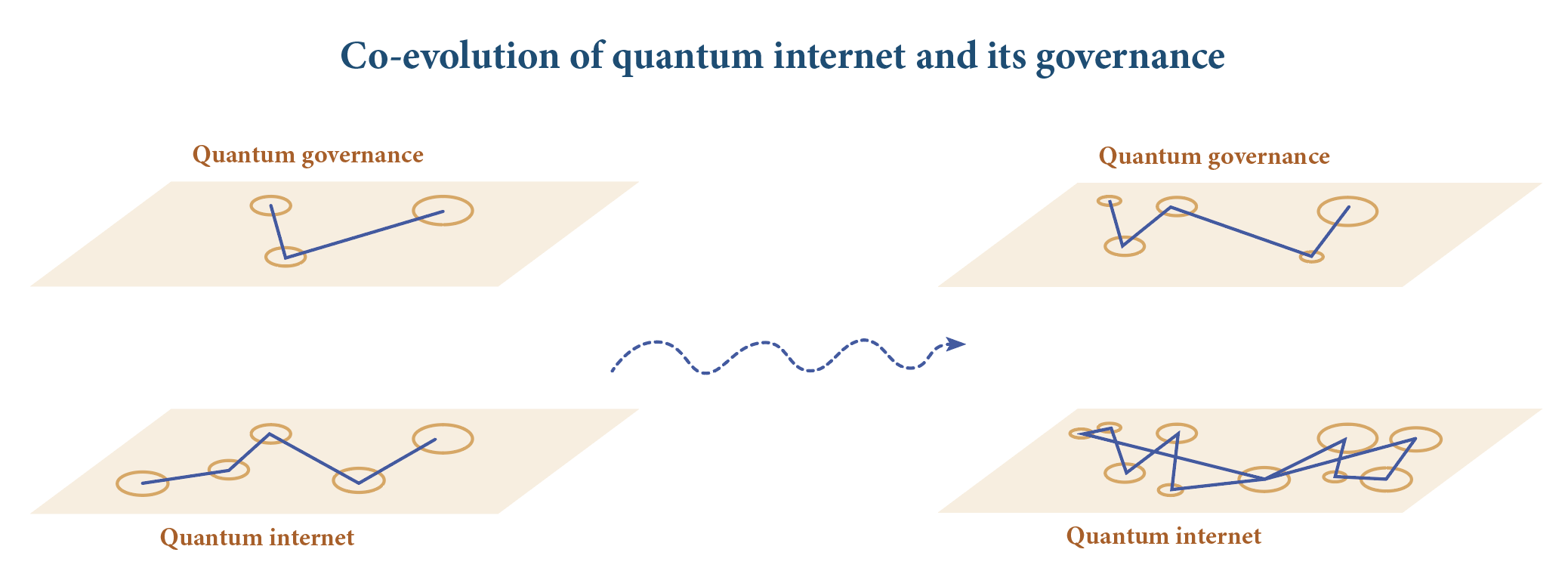Governance
All these public values hold equally for a quantum version of the internet. To maintain them new governance mechanisms will have to be developed, for the phase in which the quantum internet gets introduced, and for the phase in which it is more established. This is because quantum internet will substantially change the way we can communicate. For example, it makes available new encryption methods of that communication, which may require new governance for surveilling that communication to maintain security. The future use of quantum internet may, furthermore, reveal that new public values have to be protected, requiring new forms of governance. For example, twenty years ago we probably did not imagine that the usage of classical internet can lead to substantial privacy infringements. Hence privacy emerged through the usage of classical internet as a value for which new governance was needed. New surprises are to be expected once the quantum internet will be used on a regular basis.

During the introductory phase equal access may be an issue
Let’s explore a little bit more the values for which governance of the quantum internet may be needed. In the phase in which the quantum internet is introduced, issues emerge about values such as security, privacy, flexibility, trust and equal access. Initially, the quantum internet will be available to a few pioneering users in academia and industry, and a value issue that then emerges is one of equal access. Do we want it to develop to a public infrastructure? If we want this, regulation and legislation can direct the development of quantum internet in this direction.
Quantum computing raises additional issues
Looking beyond quantum internet, the emergence of quantum computing raises issues of security, privacy and trust. Quantum computing may make current encryption of communication vulnerable, enabling users of quantum computers to infringe on the privacy of others. Digital databases containing state or industrial secrets can be decrypted, leading to security issues. Moreover, daily communication that uses security, such as financial transactions, video links, GPS signals and software updates, may be decrypted leading to real or perceived breaches in public trust in these vital forms of communication. Governance may be the response to these threats. It may be necessary to install legislation that requires better encryption of databases or to regulate the use of quantum computers by private parties. It may also lead to policies speeding up the development and use of quantum internet for securing financial transactions, GPS signals and software updates. The quantum internet may thus actually restore public values such as security, privacy and trust in communication. Yet, to be able to play this role governance needs to be in place first. Users from banks to governmental agencies may decide to use the quantum internet for securing their communication only when quantum internet encryption tools are standardized and certified.
Governance can protect and promote values
Once the quantum internet is established and all its users can engage in secure communication, a security issue surfaces about surveillance. Possibilities for scanning digital communication for its content, for policing or for national security reasons, become limited. Governance may mean that only those quantum internet encryption tools will be allowed that enable states to decrypt it, say through a security backdoor or through other measures. The question is whether this is desirable, since others might use the backdoor as well, and – again – governance will be needed to regulate the use of such decryption capabilities. Governance is, however, not just a response when public values are jeopardized; it also enables the realization of such values. It may create trust in the use of the quantum internet and it may through that trust, foster economic growth by offering companies a basis to develop new activities and opening up new markets. That new commercial development may, like the classical internet, raise new issues about public values. And it is again governance that is to direct the usages and developments towards avoiding undesired effects.
Waiting too long poses a risk
To be able to judge which regulations, legislation and institutions are needed, governing organizations, from states to banks, should inform themselves about what the quantum internet may bring. The outcome may be that it brings gradual changes, implying that changes in governance can be gradual as well. However, a serious risk is that governance is initiated too late, as for instance regulation for data protection only emerged after privacy was violated for a while. More knowledge about this impact may also lead to the conclusion that immediate action is needed for bringing the innovation the quantum internet brings in sync with our public values.
security
safety
resilience
trust
privacy
equal access
net neutrality
We want the internet in its current classical form to comply with our public values. These values include security, safety, resilience, trust, privacy, equal access and net neutrality. Over time, all kinds of governance mechanisms have emerged so the operation and development of the internet can better meet our values and avoid undesired effects. The classical internet consists of physical infrastructure such as cables, data centers, antennas, routers, terminals and sensors, and a protocol stack to ensure that nodes can find each other and route data. And its distributed governance consists of international and national regulations, legislation, standards, and contractual agreements among organizations and institutions that enable the smooth operation and expansions of all that infrastructure. Moreover, governance enables the emergence of public and commercial activities through, for instance, the acknowledgement of domain names, copyright, tax payment and electronic signatures. Finally, it aims at preventing misuse of internet by, e.g., detection of criminal activities.